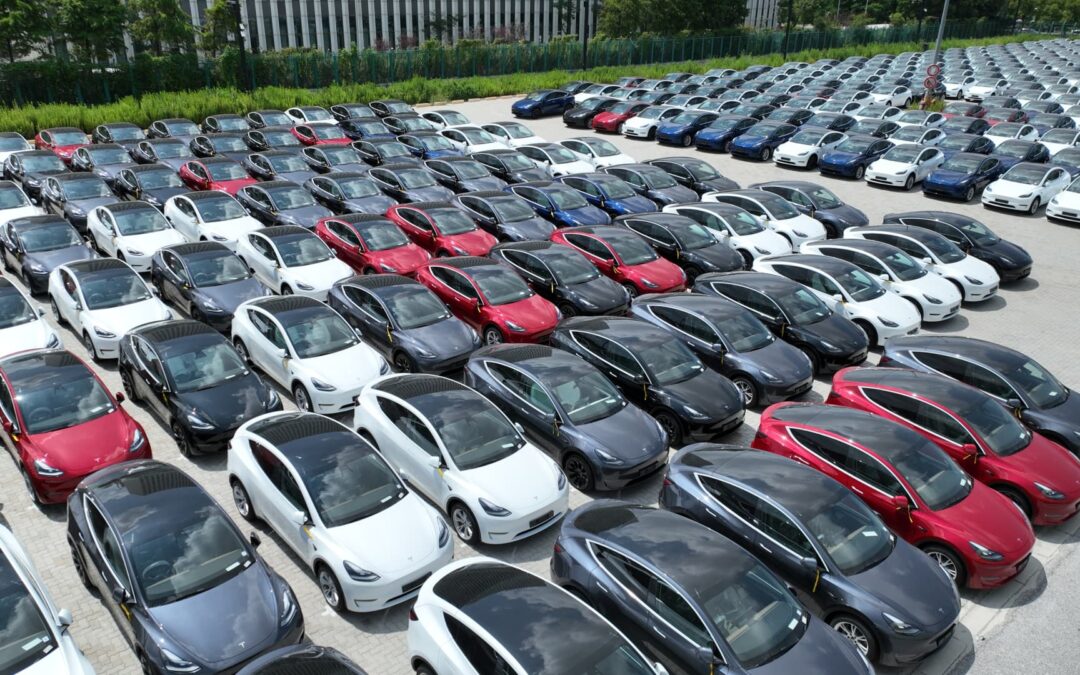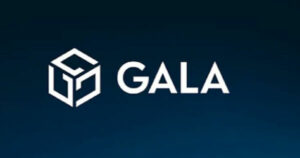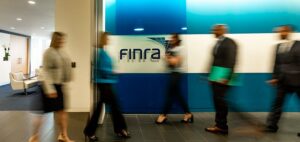SHANGHAI, CHINA – SEPTEMBER 06: Aerial view of Tesla vehicles waiting to be loaded on board a roll-on-roll-off cargo vessel at Nangang port on September 6, 2023 in Shanghai, China. (Photo by VCG/VCG via Getty Images)
Vcg | Visual China Group | Getty Images
Tesla shares soared 10% in the first half of trading on Monday after a Morgan Stanley upgrade, and optimistic note that envisioned Tesla selling AI technology to other automakers, and saving money by using its own GPUs as much as possible, rather than paying for chip supply from Nvidia.
Morgan Stanley analysts argued that Tesla should be viewed as a tech company as much as an electric car maker. The firm set its new price target at $400 for shares of Tesla, up from a previous price target of $250, as of Monday emphasizing the potential of Tesla’s Dojo supercomputer project and custom silicon. Morgan Stanley believes Dojo could theoretically add up to $500 billion to the company’s value long-term.
CEO Elon Musk said in July this year said Tesla planned to spend more than $1 billion on Dojo by the end of 2024. Tesla is developing Dojo to help with AI machine learning and computer vision training purposes for its cars and nascent robotics effort. Among other things, Tesla uses video clips and data from its customers’ vehicles to improve existing software, and develop new features.
Highly bullish Tesla analyst Adam Jonas wrote in his note on Monday, “Although Dojo is still early in its development, we believe that its applications long-term can extend beyond the auto industry. Dojo is designed to process visual data which can lay the foundation for vision-based AI models such as robotics, healthcare and security. In our view, once Tesla makes headway on autonomy and software, third party Dojo services can offer investors the next leg of Tesla’s growth story.”
Morgan Stanley also expects Tesla to be able to generate $2,160 in recurring revenue every month from its vehicle owners in 2030, from services enabled by Dojo and subscription software in cars like self-driving systems, which Tesla does not offer today, vehicle charging services, maintenance, software upgrades, content and others to be developed in the future.
Elon Musk promised a Tesla would complete a self driving cross-country demo without any human intervention by the end of 2017. Tesla vehicles still only offer advanced driver assistance systems, which require a human behind the wheel, ready to steer or brake at any second.
By contrast, another firm that is bullish on Tesla, Deutsche Bank, noted risks to the EV maker in Q3 from “planned summer production shutdowns which will push both production and deliveries down QoQ, discounts on inventories, and limited positive costs offsets in the quarter,” and set a price target at $300 in a note out September 6.
Earlier this quarter, Tesla slashed the prices of its electric vehicles after executives cautioned investors on the company’s last earnings call that production and delivery volumes would likely decline this period versus the second quarter due to planned factory closures.
Tesla also cut the price to purchase its premium driver assistance system, marketed in the U.S. under the Full Self-Driving or FSD brand name, from $15,000 to $12,000. Those price cuts, among other things, had weighed on Tesla’s share price in recent weeks. But after the Morgan Stanley note on Monday, Tesla shares spiked above $272 mid-day.







